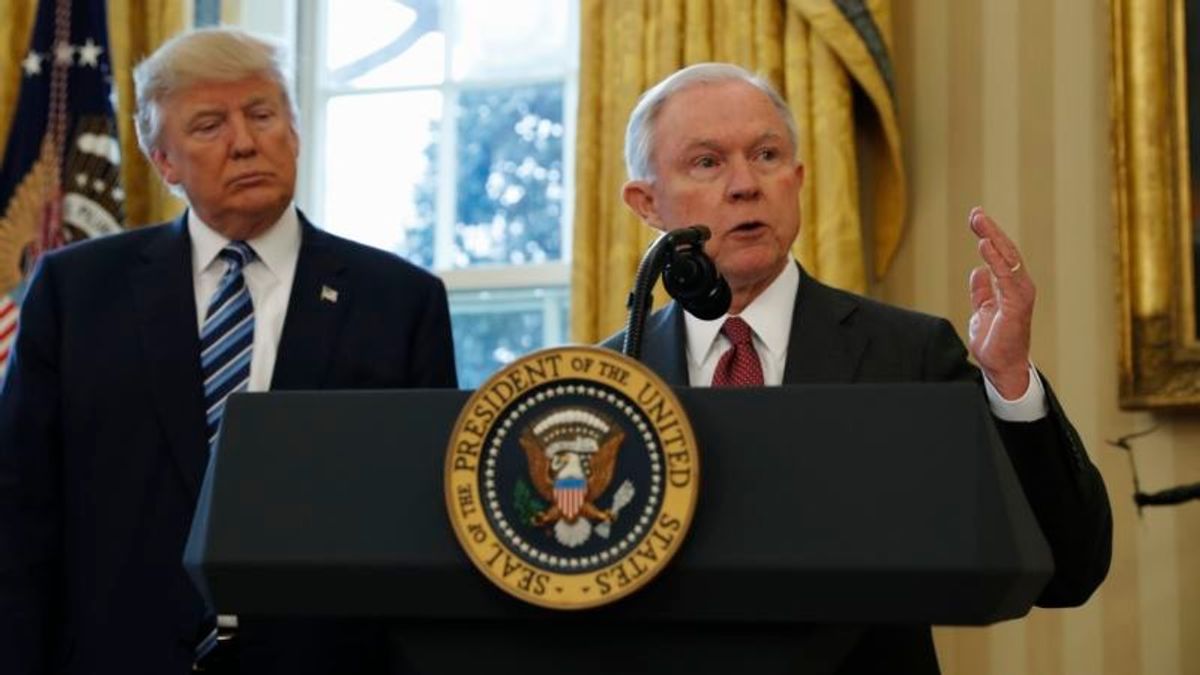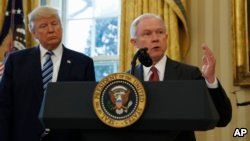
Trump Says He Wishes He’d Picked Another Attorney General
Trump Says He Wishes He'd Picked Another Attorney General

WASHINGTON —
U.S. President Donald Trump said Wednesday he wishes he had picked someone other than Jeff Sessions as his attorney general, but, according to a Trump lawyer, Sessions’ job appears safe for now.
Trump has been furious that Sessions quickly removed himself from oversight of the investigation into possible collusion between the Trump team and Russian meddling in the 2016 presidential campaign.
Sessions recused himself because of long-standing Justice Department rules prohibiting lawyers from involvement in investigations when they have a conflict of interest. In Sessions’ case, this includes his political support for Trump and his 2016 meetings with Russian Ambassador Sergey Kislyak.
Trump has often voiced frustration that Sessions’ decision left him without the country’s top law enforcement official protecting him during the probe by special counsel Robert Mueller.
But Trump vented his ire anew in a Twitter remark Wednesday after Republican Congressman Trey Gowdy said in a televised interview that Sessions did not tell Trump before he was named attorney general that he would remove himself from control of the Russia investigation.
Gowdy said he, too, would have been “frustrated” in such a situation if not told ahead of time that his attorney general would not handle “the most important case in the office.”
“There are lots of really good lawyers in the country. He could have picked somebody else!” Gowdy said on CBS News.
“And I wish I did,” Trump added in a tweet, in which he repeated Gowdy’s words.
Trump’s anger at Sessions has often prompted speculation in Washington that he would fire the attorney general.
Giuliani offers his thoughts
But Trump lawyer Rudy Giuliani told reporters at the White House Wednesday that he does not think Trump is going to fire Sessions.
Top Republican lawmakers have warned Trump not to dismiss Sessions, fearing the action could lead to his impeachment, and that he could not be assured that a new appointment as attorney general could win confirmation in the politically fractious Senate.
The New York Times reported late Tuesday that days after Sessions reused himself from the Russia probe oversight in March 2017, Trump tried but failed to get Sessions to change his mind.
The Times said Mueller is looking at Trump’s conversation with Sessions as part of his investigation into whether Trump obstructed justice in trying to thwart the probe.
Sessions followed the rules
Sessions withdrew from the Russia case oversight because of long-standing Justice Department rules prohibiting lawyers from involvement in investigations when they have a conflict of interest. In Sessions’ case, this includes his political support for Trump and his 2016 meetings with Russian Ambassador Sergey Kislyak.
Trump continues to be consumed by the Mueller investigation, tweeting often that it is a “witch hunt,” that there was no collusion between his campaign and Russia, and that he did not obstruct justice by firing FBI Director James Comey last year when he was heading the agency’s Russia investigation
Trump also claims the FBI planted a spy in his 2016 campaign in an effort to undermine his candidacy. In reality, an FBI informant spoke with three Trump associates during the campaign because of suspicion of Russian involvement.
In a Fox News interview, Gowdy said, “I am even more convinced that the FBI did exactly what my fellow citizens would want them to do when they got the information they got, and that it has nothing to do with Donald Trump.”
Despite Gowdy’s conclusion, White House spokeswoman Sarah Sanders told reporters Wednesday that “certainly there’s cause for concern” whether the FBI “acted appropriately” and that investigation of it ought to continue.
Another longtime Trump defender, Fox News legal analyst Andrew Napolitano, said Trump’s repeated claims that the FBI placed an undercover spy in his campaign “seem to be baseless.”
“There is no evidence for that whatsoever,” Napolitano said.
White House correspondent Steve Herman contributed to this report.
 Missouri Governor Greitens to Resign Amid Scandals InvestigationNext PostJudge Sets June 15 Deadline on Study of Data From Cohen Raids
Missouri Governor Greitens to Resign Amid Scandals InvestigationNext PostJudge Sets June 15 Deadline on Study of Data From Cohen Raids







